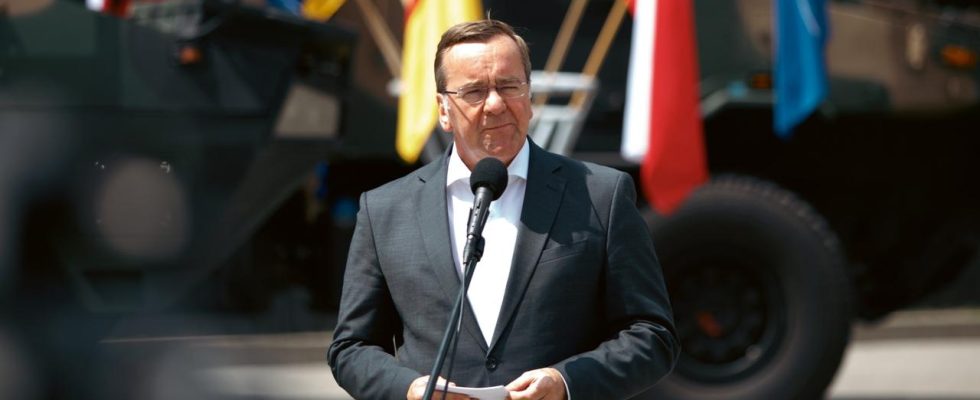analysis
Defense Minister Pistorius wanted ten billion euros more for the Bundeswehr – he only got 1.7 billion euros. An all-purpose weapon helps him. At least in the short term.
At the beginning of the year, Defense Minister Boris Pistorius deliberately raised the bar: In an interview with the “Süddeutsche Zeitung” he called for ten billion euros more per year for his defense budget – regardless of the 100 billion special fund for the Bundeswehr. His wish at the time for Finance Minister Christian Lindner: the defense budget should be “permanently increased to 60 billion euros”.
If you asked around among defense politicians at the time, they definitely expected Pistorius to end up getting six to seven billion more for the troops. But five months later, the ten billion more for the Bundeswehr have become only 1.7 billion euros. After all, Pistorius is the only minister who does not have to save, but who actually got more because of the wage round in the public sector.
One hears from the SPD that the chancellor and defense minister could have imagined even more money for the Bundeswehr, but finance minister Lindner had stonewalled. The Liberals, on the other hand, support the finance minister’s course. The chairwoman of the defense committee, FDP politician Agnes Strack-zimmermann, formulated in the ARD morning magazine very reserved: It is not just a question of money, it is also a question of procuring material. This means that appropriate material must be produced for the Bundeswehr.
The role of special fund
Above all, the debt-financed Bundeswehr special fund in the amount of 100 billion euros provides planning security for the Ministry of Defense. It is the political all-purpose weapon of the traffic light to bring the Bundeswehr into shape and to fulfill promises to NATO, at least in the medium term.
So far, according to “Handelsblatt” information, only 1.1 billion euros have flowed out of the special fund, but at least a third of the money is already contractually bound. And whether it’s new heavy transport helicopters, F-35 fighter jets or unprotected transport vehicles – from next year the special fund is to be massively spent, the Ministry of Defense hopes.
In addition to equipment and new weapon systems for the troops, this would also have a political side effect. With the help of the special fund, the federal government intends to meet NATO’s two percent target next year.
And that should work like this: In order to spend two percent of economic output on defense, Germany would have to provide 71 billion euros for the Bundeswehr in the coming year. With the only slightly increased defense budget of then almost 52 billion, this will not succeed. So the missing approximately 19 billion from the debt-financed special assets of the Bundeswehr are injected.
The federal government can probably proceed in this way until 2028 – but then at the latest it will have a big problem. Because when all the money from the special fund has been spent, the defense budget would have to increase massively in one fell swoop. On the one hand, to continue to achieve NATO’s two percent target, but on the other hand to finance the ongoing operation of the new weapon systems.
Bundeswehr financing remains “core problem”
In Finance Minister Lindner’s draft budget, the federal government pledged that NATO’s two percent quota should be adhered to from 2024. However, there is an unmistakable back door elsewhere: In the new “National Security Strategy,” the federal government has only committed itself to spending two percent of economic output on defense “on an average over several years.” This means that not every household will have to achieve this goal in the next few years.
But regardless of the NATO quota, unsolved practical questions remain when the Bundeswehr special fund has been spent. Because new weapon systems and large military equipment must also be maintained in the medium term, and that is likely to be significantly more expensive than before. Defense Minister Pistorius knows this, which is one of the reasons why he called for a larger increase in the defense budget at an early stage – as is well known, without success. But the pressure remains.
André Wüstner, Chairman of the German Armed Forces Association, speaks in the ARD morning magazine of a “core problem” that the Secretary of Defense now has to deal with. And Union parliamentary group leader Johann Wadephul also fears that without an increasing defense budget, the new large-scale equipment cannot be maintained permanently and additional personnel cannot be paid for.
Thanks to the debt-financed special fund, a lot can be bridged over the next four to five years. The federal government leaves it open how the Bundeswehr should continue financially.

